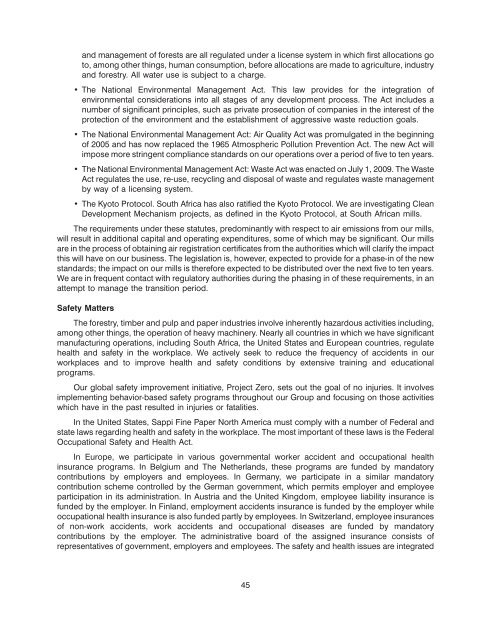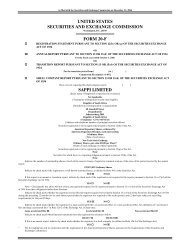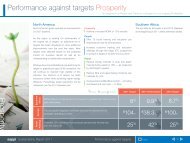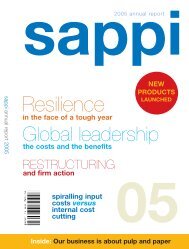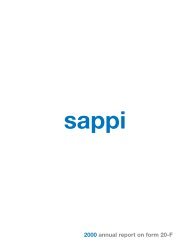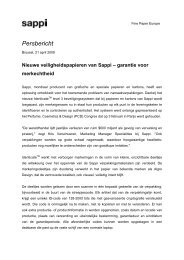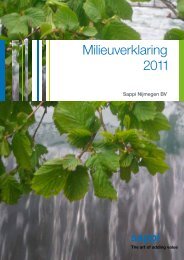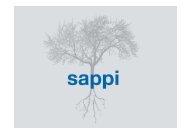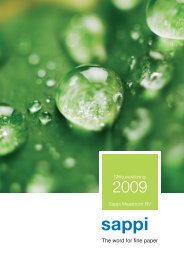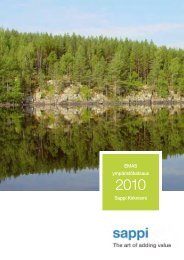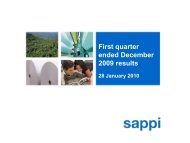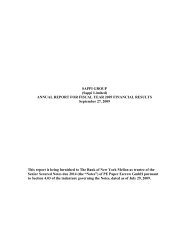You also want an ePaper? Increase the reach of your titles
YUMPU automatically turns print PDFs into web optimized ePapers that Google loves.
and management of forests are all regulated under a license system in which first allocations go<br />
to, among other things, human consumption, before allocations are made to agriculture, industry<br />
and forestry. All water use is subject to a charge.<br />
The National Environmental Management Act. This law provides for the integration of<br />
environmental considerations into all stages of any development process. The Act includes a<br />
number of significant principles, such as private prosecution of companies in the interest of the<br />
protection of the environment and the establishment of aggressive waste reduction goals.<br />
The National Environmental Management Act: Air Quality Act was promulgated in the beginning<br />
of 2005 and has now replaced the 1965 Atmospheric Pollution Prevention Act. The new Act will<br />
impose more stringent compliance standards on our operations over a period of five to ten years.<br />
The National Environmental Management Act: Waste Act was enacted on July 1, 2009. The Waste<br />
Act regulates the use, re-use, recycling and disposal of waste and regulates waste management<br />
by way of a licensing system.<br />
The Kyoto Protocol. South Africa has also ratified the Kyoto Protocol. We are investigating Clean<br />
Development Mechanism projects, as defined in the Kyoto Protocol, at South African mills.<br />
The requirements under these statutes, predominantly with respect to air emissions from our mills,<br />
will result in additional capital and operating expenditures, some of which may be significant. Our mills<br />
are in the process of obtaining air registration certificates from the authorities which will clarify the impact<br />
this will have on our business. The legislation is, however, expected to provide for a phase-in of the new<br />
standards; the impact on our mills is therefore expected to be distributed over the next five to ten years.<br />
We are in frequent contact with regulatory authorities during the phasing in of these requirements, in an<br />
attempt to manage the transition period.<br />
Safety Matters<br />
The forestry, timber and pulp and paper industries involve inherently hazardous activities including,<br />
among other things, the operation of heavy machinery. Nearly all countries in which we have significant<br />
manufacturing operations, including South Africa, the United States and European countries, regulate<br />
health and safety in the workplace. We actively seek to reduce the frequency of accidents in our<br />
workplaces and to improve health and safety conditions by extensive training and educational<br />
programs.<br />
Our global safety improvement initiative, Project Zero, sets out the goal of no injuries. It involves<br />
implementing behavior-based safety programs throughout our Group and focusing on those activities<br />
which have in the past resulted in injuries or fatalities.<br />
In the United States, Sappi Fine Paper North America must comply with a number of Federal and<br />
state laws regarding health and safety in the workplace. The most important of these laws is the Federal<br />
Occupational Safety and Health Act.<br />
In Europe, we participate in various governmental worker accident and occupational health<br />
insurance programs. In Belgium and The Netherlands, these programs are funded by mandatory<br />
contributions by employers and employees. In Germany, we participate in a similar mandatory<br />
contribution scheme controlled by the German government, which permits employer and employee<br />
participation in its administration. In Austria and the United Kingdom, employee liability insurance is<br />
funded by the employer. In Finland, employment accidents insurance is funded by the employer while<br />
occupational health insurance is also funded partly by employees. In Switzerland, employee insurances<br />
of non-work accidents, work accidents and occupational diseases are funded by mandatory<br />
contributions by the employer. The administrative board of the assigned insurance consists of<br />
representatives of government, employers and employees. The safety and health issues are integrated<br />
45


